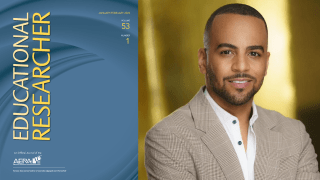Associate Professor Royel M. Johnson, along with fellow members of the editorial team of Educational Researcher, recently published a “Letter from the Editors” outlining their vision for their term. The new group’s term began in January 2024 and will run through 2026. The publication, a peer-reviewed journal published by the American Educational Research Association (AERA), debuted in 1972 and was ranked in the top 2% (7/268) of education and educational research journals in 2022.
The letter was published as an introduction to the journal’s Volume 53, Issue 1, January/February 2024, the first issue under the purview of the new editorial team. The group explained that they will continue the journal’s mission to make major educational research widely accessible and uphold its “intellectual integrity” and “standards of excellence” while expanding the publication’s inclusion of “underrepresented voices” and its coverage of topics that “reflect our changing society,” including include artificial intelligence in education, school safety and violence, and student mental health.
The letter detailed the steps taken to diversify the editorial leadership “in expertise, experience, and background,” efforts that are reflected in the new team. Associate editors and the editorial board have also been diversified to “bring in a range of voices to represent a wide range of perspectives and methods in education research.” This same level of attention has also been brought to the “representation of colleagues from diverse institutions,” some of which might not have been represented in the past.
The editors extend this vision to the articles they seek to publish in the journal: “We are committed to making ER a home for critical examinations of race, gender, social class, sexuality, and disability (among other social identities), along with the intersections among these and their relationship with educational equity. Thus, we invite your consequential education research that challenges deeply entrenched disparities and advocates for just educational practices and policies.”
The team also outlined the various types of submissions the journal will continue to accept, which include feature articles, reviews/essays, briefs and policy forum.
“ER has been my favorite journal since my doctoral studies, and leading it now is a true honor," Johnson said. "My co-editors and I are committed to co-constructing an inclusive future vision for ER, a task more critical than ever amidst concerted and well-funded assaults on access to knowledge. Indeed, we are dedicated to preserving the journal’s intellectual integrity, ensuring it remains a space for reliable, rigorous scholarship.”
The journal’s editorial team is comprised of Nicholas A. Bowman, University of Iowa, editor-in-chief and co-editors Olusola O. Adespoe, Washington State University; Brian P. An, University of Iowa; Royel M. Johnson, University of Southern California; Angela Urick, Baylor University; and Ajalé Welton, University of Wisconsin-Madison.





